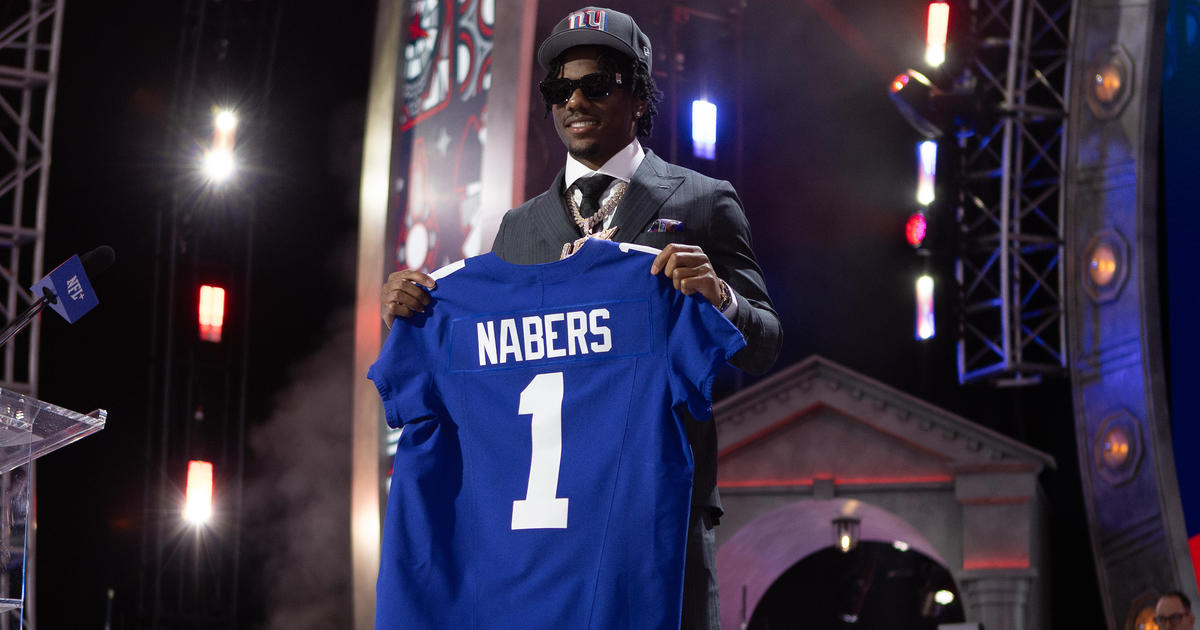Health Insurance Markets Open To Surge Of New Customers And Problems
NEW YORK (CBSNewYork/AP) -- The online insurance marketplaces that are at the heart of President Barack Obama's healthcare overhaul struggled to handle the wave of new consumers Tuesday, the first day of a six-month open enrollment period.
A combination of high demand and technical glitches seemed to overwhelm the online system early in the day. Federal and state officials were working to address the problems, which led to long waits on government websites and a federal call center.
Speaking Tuesday from the Rose Garden, Obama blamed some of the website slowdown on the fact that more than 1 million people visited Healthcare.gov before 7 a.m., adding that demand had initially exceeded anything officials expected.
"Consider that just a couple of weeks ago, Apple rolled out a new mobile operating system and within days they found a glitch, so they fixed it," Obama said. "I don't remember anybody suggesting Apple should stop selling iPhones or iPads or threatening to shut down the company if they didn't."
People visiting the NY State of Health website after its launch at 8 a.m. Tuesday were greeted with error messages when clicking on links to register as individuals or families.
The links for employers, employees and brokers also experienced periodic problems.
LINKS: HealthCare.gov | NY State of Health | EXTRA: More Information About The Affordable Care Act
"The website went on the blink twice and I just had to abandon it," unemployed diabetic Shanti Masterson told CBS 2's Amy Dardashtian. "After creating an account I logged onto the homepage. I'm clicking 'get started,' error page. Let's try this again. Homepage, get started, error page again."
Even employees at a help center on Southern Boulevard couldn't get past the homepage.
"It's too confusing. It's not user friendly," one employee said. "It's confusing for us as well, so I can imagine what its like for customers."
Single mother Carmen Colon said she had so many questions, but couldn't get straight answers.
"Is it gonna cover everything? What about emergency visits? How much is it gonna cost?" Colon said.
Alfredo Piedra is a medical librarian at the Queens Library.
"The seniors and low income people, they have a hard time with computer literacy," Piedra said.
The Queens Library is one of dozens of spots set up to help people enroll. There are consumer health sections and employees are trained to take customers through the process step by step
Piedra said you shouldn't just purchase based on cost because while premiums may be low, out-of-pocket costs could be high later on. Here are some questions to ask:
How much is a premium? How much is a deductible? What does the plan cover?
Masterson said she is hoping her doctor is in network.
"I'm hoping that by the time I go back home the system will be back again so I can try. I'll call the number also,' she said.
A spokesman for the Department of Health blamed the problems on the 2 million visits to the website in the first 90 minutes after its launch. He said the agency's technicians were working to fix the problem.
In Connecticut, Access Health CT sent out a tweet shortly before noon Tuesday, confirming the marketplace logged 10,000 visitors in the first three hours of operation and 22 enrollments.
The nationwide rollout comes after months of buildup in which the marketplaces, also known as exchanges, have been both praised and vilified.
Illustrating the heated political disagreements over the law, the opening of the exchanges came the same day as the shutdown of the federal government, led by congressional Republicans who want to block the health insurance reforms from taking effect.
The shutdown will have no immediate effect on the insurance marketplaces that are the backbone of the law, because they operate with money that isn't subject to the annual budget wrangling in Washington.
The marketplaces represent a turning point in the nation's approach to healthcare, the biggest expansion in coverage in nearly 50 years.
The Obama administration hopes to sign up 7 million people during the first year and aims to eventually sign up at least half of the nearly 50 million uninsured Americans through an expansion of Medicaid or government-subsidized plans.
But if people become frustrated with glitches in the computer-based enrollment process and turn away from the program, the prospects for Obama's signature domestic policy achievement could dim.
"The promise of the law is that no one will go bankrupt because of medical bills,'' said Neera Tanden, president of the
Center for American Progress, which helped work for passage of the law. "It won't happen in the first day or the first year. But when the law is fully operational, it will provide an economic benefit to roughly 30 million Americans.''
Tanden cautioned against rushing to judge the marketplace's success on its first-day performance. Numerous observers have predicted bugs and setbacks. Trained outreach workers in many states were having trouble getting the certification they need to start helping people to enroll.
Many states are predicting that people will initially test the online application system, but actually sign up closer to Dec. 15, which is the deadline for coverage to start Jan. 1. Customers have until the end of March to sign up in order to avoid tax penalties.
New York was among the first to have its exchange approved by the federal government.
The state expects to enroll 1.1 million uninsured over the next three years, with 650,000 joining plans for individuals, including sole proprietors of businesses, and another 450,000 joining the plans available to small businesses with 50 or fewer employees.
Monthly premiums range from $134 for catastrophic coverage in the greater Rochester area to $913 for a particular "platinum'' plan on Long Island.
New York Secretary of State Cesar Perales was in Queens on Tuesday giving out information to assist residents signing up for the Affordable Care Act.
Carmen Quintuna of Glendale, Queens was looking to sign up for the so-called individual mandate for her family of four.
Health Insurance Markets Open; Success To Be Seen
"I lost my health insurance. I really hope this plan works for us. I hope I can find affordable health insurance, something I can pay," Quintuna told 1010 WINS' Mona Rivera.
As WCBS 880's Marla Diamond reported, trained enrollment workers did not have many takers in the Bronx. Many potential registrants expressed concerns as they got information about the program.
"I really don't understand everything about it that's going on. I know some people is against it and I can't say whether I am against it or for it. I have to think about it a little bit more," Nancy Johnson told Diamond.
Health Insurance Markets Open To Surge Of New Customers
Cuomo administration officials were out in force Tuesday, urging people to sign up.
"Most of the people here are entitled to rebates so I think that's very positive," New York State Department of Labor Commissioner Peter Rivera told Diamond. "The shutdown of the government has no impact on the implementation of the Affordable Care Act. The money was set aside. It's being implemented even as we speak."
He said the first step is to arm people with information on the healthcare law.
"At the end of the day, all of us -- not some people versus another -- but all of us are going to find cheaper health insurance and we're seeing that right now," Rivera said.
The prospect of signing up can be a little daunting, so Jersey City has rolled out a mobile navigator program to assist residents.
"We're going out business to business and signing people up and giving them information," Mayor Steven Fulop told WCBS 880's Peter Haskell.
The funding for the program came from a $400,000 federal grant.
"Most people have no idea how to do it or even the timing that it's starting," said Fulop.
The mayor estimates there are 55,000 city residents without health insurance.
Health Insurance Markets Open; Success To Be Seen
Looming as one of the biggest challenges to the law's success is the ability of insurers to persuade relatively young and healthy people to buy insurance, as a way to balance the costs for the sicker people who are likely to get coverage as quickly as possible.
"You've got to launch this thing right the first time,'' said Robert Laszewski, a consultant who worked 20 years in the insurance industry. "If you don't, financially you will never recover.''
Under the law, health insurance companies can no longer deny coverage to someone with a pre-existing medical condition and cannot impose lifetime caps on coverage.
They also must cover a list of essential services, ranging from mental health treatment to maternity services.
How It Works
If you have insurance already, the open enrollment will not affect you at all and you do not need to take action, CBS News Business Analyst Jill Schlesinger explained.
"If you have insurance through your employer, if you're on Medicare, if you're on Medicaid, if your child is covered by CHIP, you're on COBRA, relax, take a deep breath," she said. "You don't have to do anything. You are covered."
Otherwise, it all depends on how much you make, whether you are looking for individual or family coverage and how much coverage you want.
To sign up, go to HealthCare.gov, the official federal site set up to enroll people. You will be asked to:
1. Create an account, including providing some basic information.
2. Apply for coverage. That will involve entering household income, size and additional information.
3. Select a health plan. You will be presented with all the health insurance plans you qualify for so that coverage types can be compared.
4. Enroll in a health plan. Coverage starts as soon as Jan. 1, 2014.
Anyone who needs help choosing a plan also may turn to so-called "navigators" in their state, who are available to answer questions and otherwise ease the process of signing up.
People also may apply for coverage online, by mail or with the help of a navigator.
Click here to get assistance in your area.
Below are important dates to know as the health care roll-out begins:
• Oct. 1, 2013 – Open enrollment starts
• Jan. 1, 2014 – Health coverage starts
• March 31, 2014 – Open enrollment ends
For those who do not sign up by the end of the year, they will be paying a penalty. For 2014, the penalty will be $95 per year for each uninsured adult in the household – capped at $285 per household or 1 percent of your income.
The cost rises over the next couple of the years. By 2016, it will be $695 per person – capped at $2,085 per household — or 2 percent of your income.
You May Also Be Interested In These Stories:
(TM and © Copyright 2013 CBS Radio Inc. and its relevant subsidiaries. CBS RADIO and EYE Logo TM and Copyright 2013 CBS Broadcasting Inc. Used under license. All Rights Reserved. This material may not be published, broadcast, rewritten, or redistributed. The Associated Press contributed to this report.)



